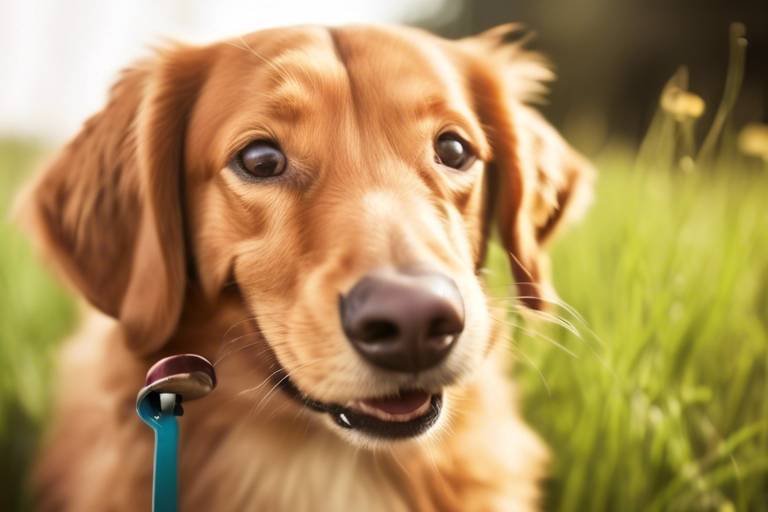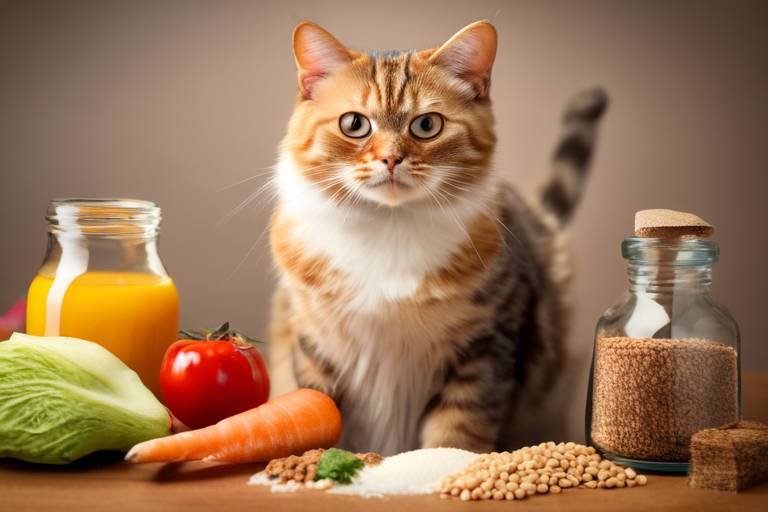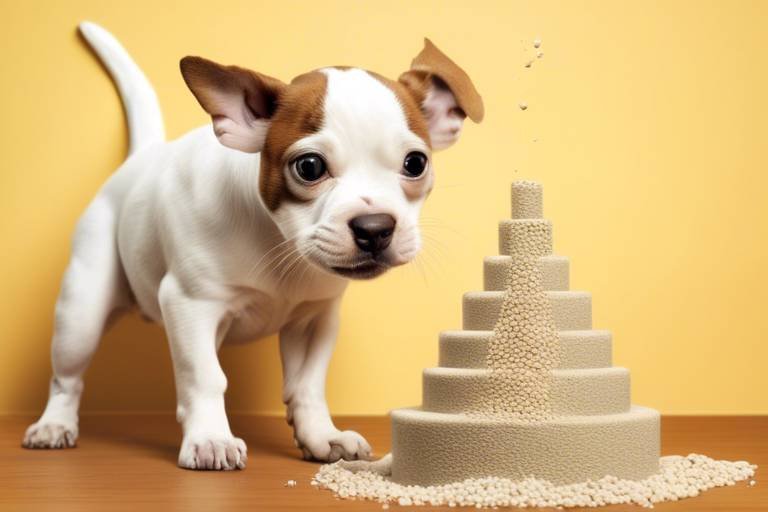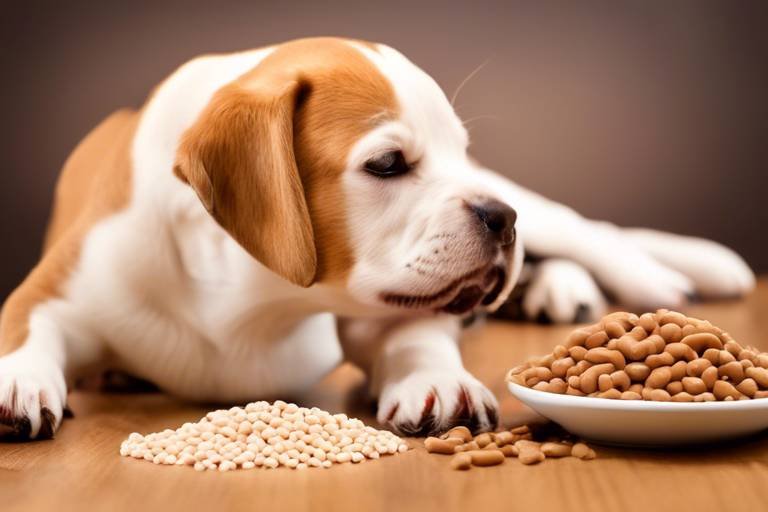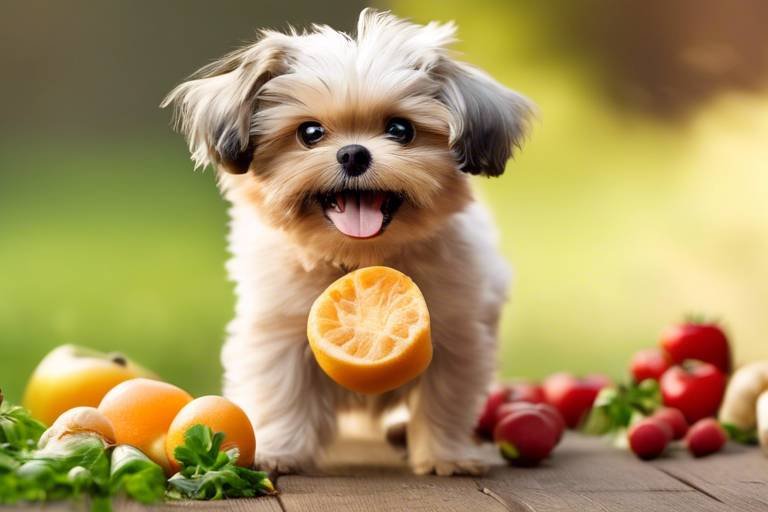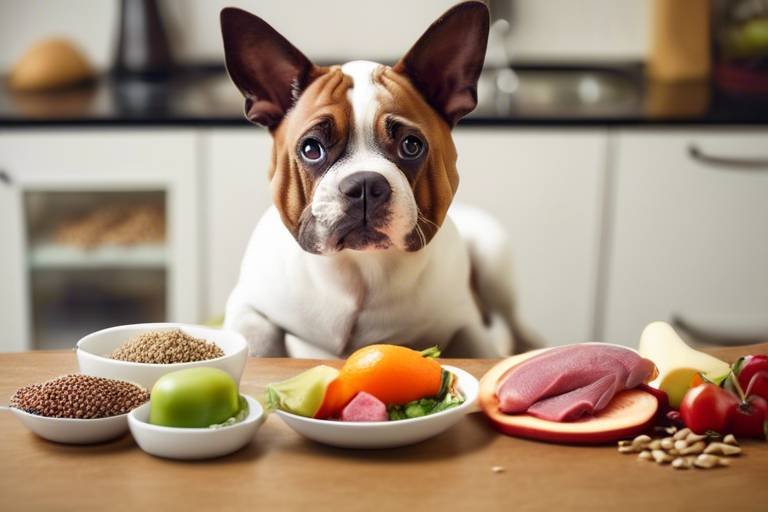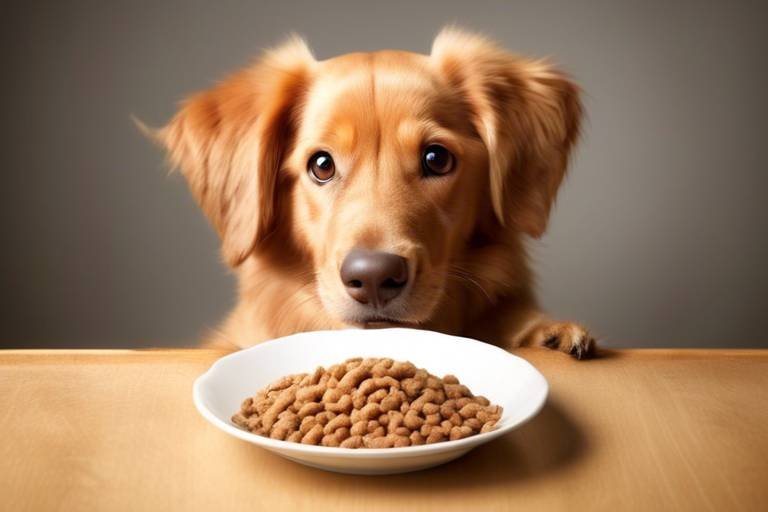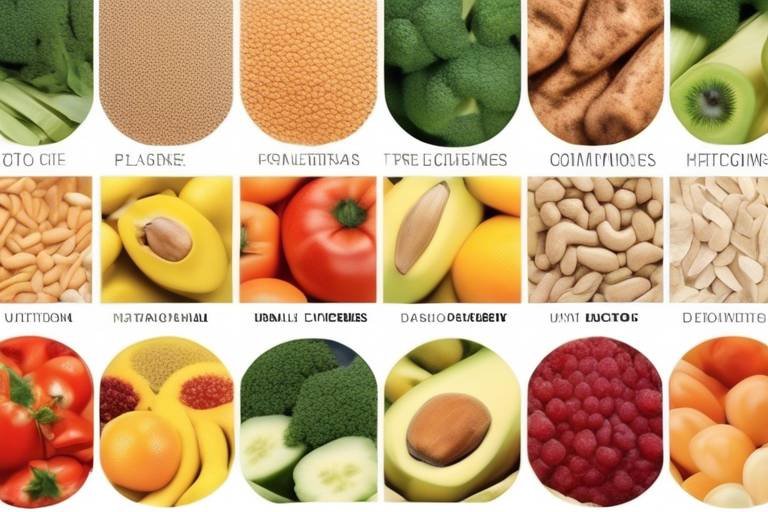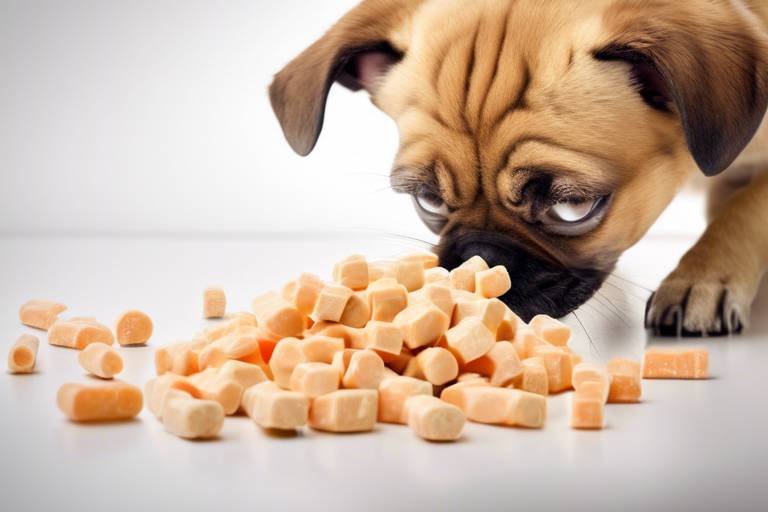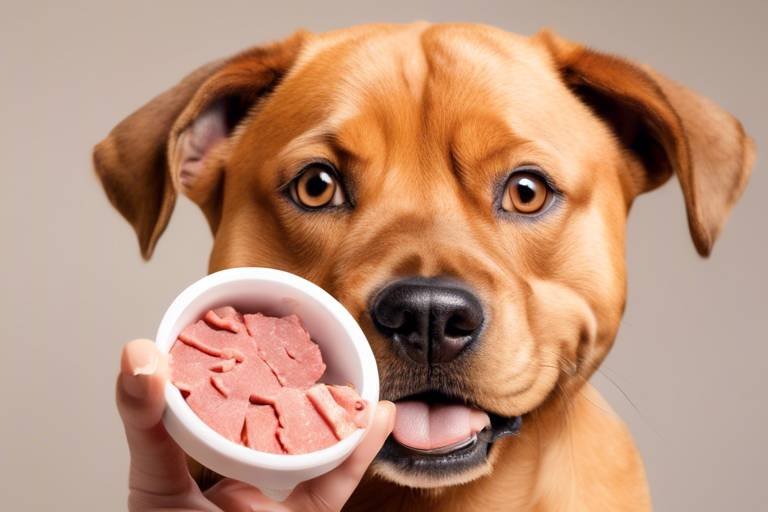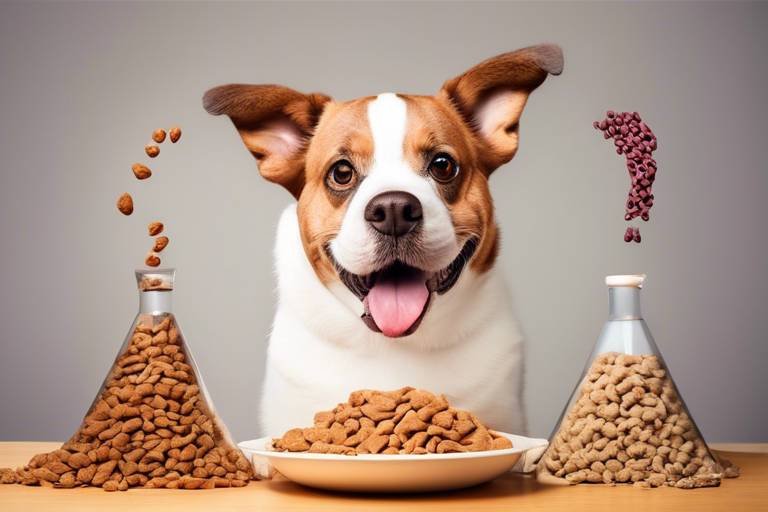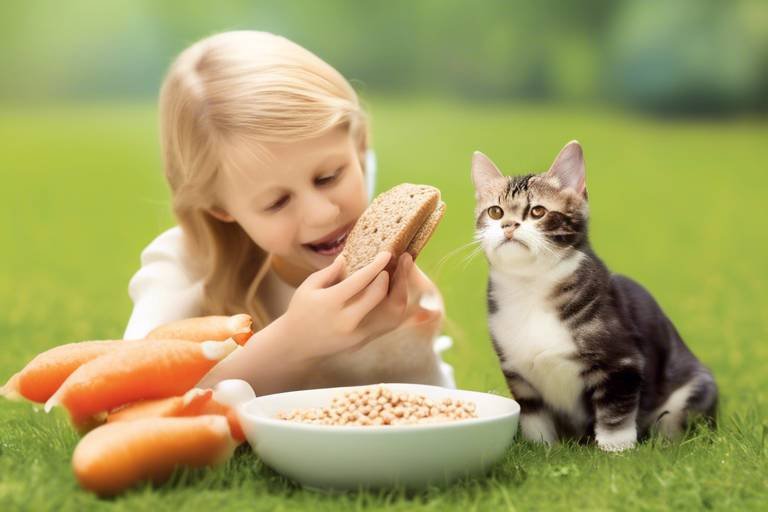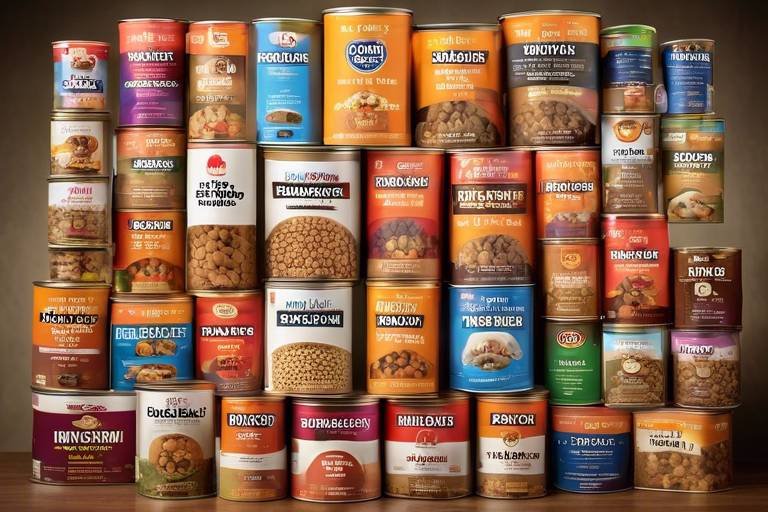The Importance of Digestive Health for Pets
When it comes to our beloved furry friends, their digestive health is often overlooked, yet it plays a pivotal role in their overall well-being. Just like us, pets require a well-functioning gastrointestinal tract to absorb nutrients effectively and eliminate waste. Imagine your pet as a finely tuned machine; if one part isn’t working correctly, the entire system can falter. A healthy digestive system not only contributes to your pet's energy levels but also influences their mood, coat quality, and even longevity. So, why should we care about our pets' digestive health? Well, the answer is simple: a happy gut leads to a happy pet!
Many pet owners may not realize that common digestive issues can significantly impact their pets' lives. Conditions like diarrhea, constipation, and vomiting can emerge from poor dietary choices, stress, or underlying health problems. It's essential to be aware of these issues and recognize the signs early on. After all, your pet can't tell you when something's wrong, but they can show you through their behavior. Being proactive about their digestive health means you can enjoy more quality time with your furry companion and fewer trips to the vet.
Digestive health encompasses the proper functioning of the gastrointestinal tract, which is essential for nutrient absorption and waste elimination. A well-functioning digestive system contributes to a pet's energy levels and overall vitality. Think of it this way: if your pet's digestive system is like a highway, then nutrients are the cars that need to travel smoothly to reach their destination. Any blockage or traffic jam can lead to serious issues. Therefore, maintaining a clear and efficient route is crucial for your pet's health.
Pets can experience various digestive problems, including diarrhea, constipation, and vomiting. Understanding these issues can help pet owners identify symptoms early and seek appropriate veterinary care to prevent complications. For example, if your pet suddenly refuses food or shows signs of discomfort, it may be time to investigate further. Being attuned to your pet's behavior and physical condition can make all the difference in catching potential problems before they escalate.
Recognizing the signs of digestive distress is crucial for timely intervention. Symptoms may include:
- Changes in appetite
- Lethargy
- Unusual bowel movements
- Abdominal discomfort
These signs can prompt owners to consult a veterinarian. Remember, a little vigilance can go a long way in ensuring your pet's digestive health remains in check.
A balanced diet plays a vital role in maintaining digestive health. Pet owners should prioritize high-quality ingredients and avoid fillers to ensure their pets receive the necessary nutrients for optimal digestion. Think of your pet's diet as the fuel for their engine; the better the fuel, the better the performance. Foods rich in fiber, probiotics, and essential nutrients can help keep your pet's digestive system running smoothly.
Probiotics can significantly benefit pets by promoting a healthy gut flora. Supplementing with probiotics may help alleviate digestive issues and enhance nutrient absorption, contributing to overall well-being. It's like giving your pet a little army of good bacteria to fight off the bad guys in their gut! Just be sure to consult your veterinarian before adding any supplements to your pet's regimen.
Preventive care is essential for maintaining digestive health. Regular veterinary check-ups, a balanced diet, and proper hydration can help mitigate potential digestive problems and promote long-term health. Think of these measures as a shield protecting your pet from digestive woes. By taking a proactive approach, you can help ensure that your furry friend stays happy and healthy.
Adequate hydration is critical for digestive health in pets. Water aids in digestion, nutrient absorption, and waste elimination, making it essential for pet owners to ensure their pets have constant access to fresh water. Without sufficient hydration, even the best diet can fall short, leading to issues like constipation or urinary problems. So, make it a habit to check your pet's water bowl regularly!
Selecting the right food for your pet is crucial for digestive health. Look for age-appropriate, species-specific diets that cater to your pet's unique nutritional needs and digestive sensitivities. It's important to read labels and understand what goes into your pet's food. Just like we wouldn't eat junk food every day, our pets deserve better than low-quality ingredients.
Maintaining a healthy weight and regular exercise is vital for digestive health. Overweight pets are more prone to digestive issues, so encouraging physical activity can help keep their digestive systems functioning optimally. Think of exercise as a natural way to keep things moving in your pet's digestive tract, preventing issues before they arise.
Q: How can I tell if my pet has a digestive issue?
A: Look for signs such as changes in appetite, lethargy, unusual bowel movements, or signs of discomfort. If you notice any of these symptoms, consult your veterinarian.
Q: Are probiotics safe for all pets?
A: While probiotics are generally safe, it's essential to consult your vet before introducing any new supplements to your pet's diet.
Q: How much water should my pet drink daily?
A: It varies by size and activity level, but a good rule of thumb is about an ounce of water per pound of body weight. Always ensure your pet has access to fresh water.
Q: Can diet alone improve digestive health?
A: While a balanced diet is crucial, other factors like hydration, exercise, and regular veterinary check-ups also play significant roles in maintaining digestive health.
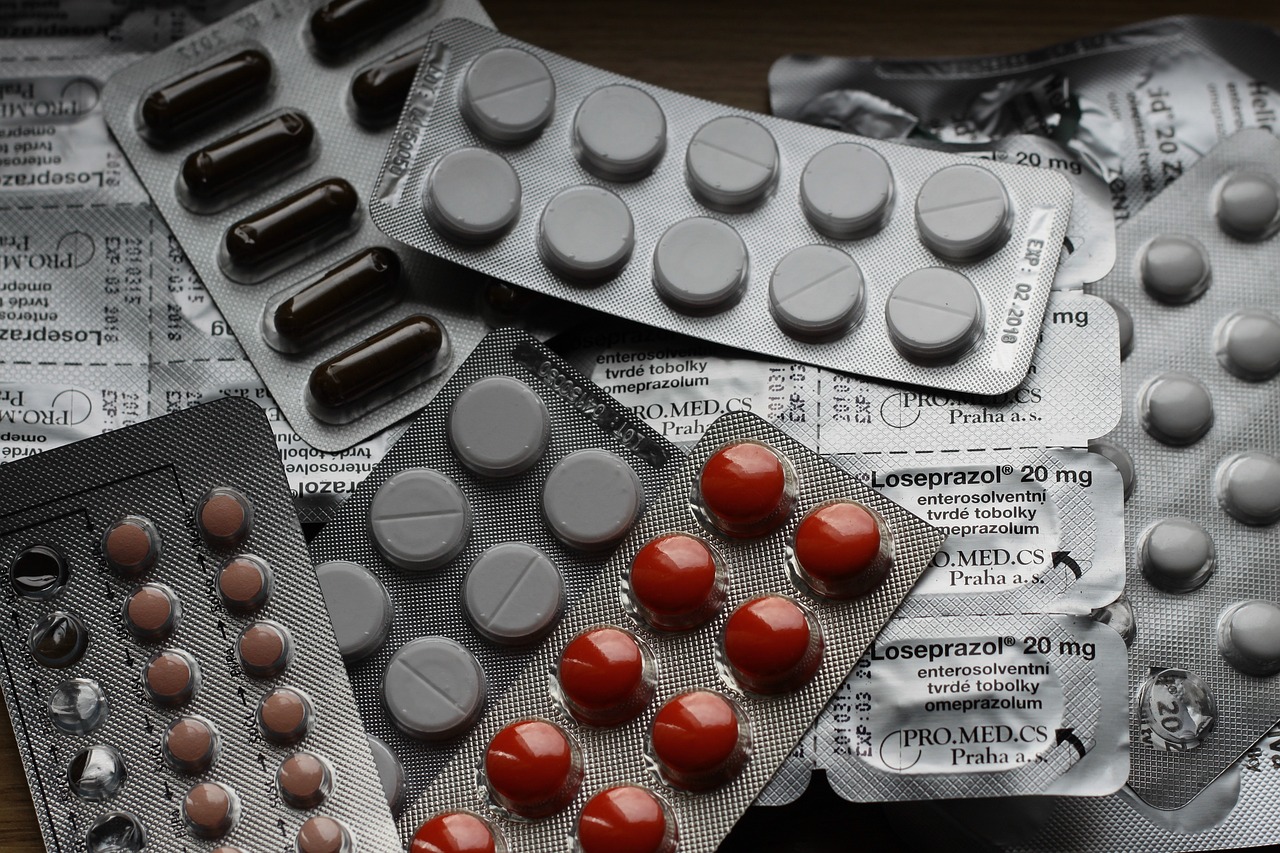
Understanding Digestive Health
This article explores the significance of digestive health in pets, highlighting its impact on overall well-being, common digestive issues, and tips for maintaining a healthy digestive system for your furry friends.
When we talk about digestive health in pets, we're diving into a vital aspect of their overall well-being. Think of the gastrointestinal tract as a complex highway system that facilitates the journey of food from the moment it enters your pet's mouth until it exits as waste. This intricate network is essential for nutrient absorption and waste elimination, which are crucial for maintaining energy levels and vitality in our furry companions. Just like a well-oiled machine, a properly functioning digestive system ensures that your pet can absorb all the necessary nutrients from their food, fueling their playful antics and curious explorations.
So, why is digestive health so important? Well, if your pet's digestive system is not functioning optimally, it can lead to a cascade of health issues. Imagine trying to run a marathon without proper fuel; it just wouldn’t work! A healthy digestive system not only helps in breaking down food but also plays a significant role in the immune system. A well-balanced gut flora can help fend off diseases and keep your pet feeling their best.
Moreover, the impact of digestive health extends beyond just physical well-being. Pets with digestive issues may exhibit behavioral changes, becoming lethargic or irritable due to discomfort. This is why understanding the signs of digestive distress is crucial for pet owners. If you notice any changes in your pet's eating habits, energy levels, or bowel movements, it might be time to consult your veterinarian. After all, being proactive can make all the difference in keeping your furry friend happy and healthy.
In addition to recognizing the symptoms, it’s important to consider the role of diet in maintaining digestive health. A balanced diet rich in high-quality ingredients can work wonders for your pet’s gut. Avoiding fillers and opting for foods that cater to your pet's specific needs can significantly enhance their digestive function. This is where reading labels becomes essential—just like you would for your own groceries, take the time to understand what goes into your pet's food.
To sum it up, understanding digestive health is a multifaceted endeavor that requires attention to diet, symptom recognition, and overall wellness. By prioritizing your pet's digestive health, you are not just investing in their physical health, but also in their happiness and quality of life. So, let’s keep those digestive highways clear and running smoothly!
Pets can experience various digestive problems, including diarrhea, constipation, and vomiting. Understanding these issues can help pet owners identify symptoms early and seek appropriate veterinary care to prevent complications.
Recognizing the signs of digestive distress is crucial for timely intervention. Symptoms may include changes in appetite, lethargy, unusual bowel movements, and abdominal discomfort, prompting owners to consult a veterinarian.
A balanced diet plays a vital role in maintaining digestive health. Pet owners should prioritize high-quality ingredients and avoid fillers to ensure their pets receive the necessary nutrients for optimal digestion.
Probiotics can significantly benefit pets by promoting a healthy gut flora. Supplementing with probiotics may help alleviate digestive issues and enhance nutrient absorption, contributing to overall well-being.
Preventive care is essential for maintaining digestive health. Regular veterinary check-ups, a balanced diet, and proper hydration can help mitigate potential digestive problems and promote long-term health.
Adequate hydration is critical for digestive health in pets. Water aids in digestion, nutrient absorption, and waste elimination, making it essential for pet owners to ensure their pets have constant access to fresh water.
Selecting the right food for your pet is crucial for digestive health. Look for age-appropriate, species-specific diets that cater to your pet's unique nutritional needs and digestive sensitivities.
Maintaining a healthy weight and regular exercise is vital for digestive health. Overweight pets are more prone to digestive issues, so encouraging physical activity can help keep their digestive systems functioning optimally.
- What are the signs of digestive problems in pets? Look for symptoms such as vomiting, diarrhea, constipation, and changes in appetite or energy levels.
- How can I improve my pet's digestive health? Focus on a balanced diet with high-quality ingredients, ensure proper hydration, and consider probiotics.
- Is it normal for pets to have occasional digestive issues? While occasional issues can happen, persistent problems should be evaluated by a veterinarian.
- How much water should my pet drink? Pets should have constant access to fresh water; the amount can vary based on size, diet, and activity level.

Common Digestive Issues in Pets
When it comes to our furry friends, digestive health is often an overlooked aspect of their overall well-being. Just like humans, pets can experience a variety of digestive issues that can affect their quality of life. Understanding these common problems is essential for every pet owner. After all, wouldn’t you want to know if your pet was feeling under the weather?
Some of the most prevalent digestive issues in pets include diarrhea, constipation, and vomiting. Each of these conditions can stem from various causes, ranging from dietary indiscretion to underlying health problems. For instance, if your pet has a habit of scavenging food from the garbage or indulging in table scraps, they might be at a higher risk for digestive upsets. It’s crucial to be observant and recognize when your pet is not acting like their usual self.
Let’s break down these common digestive issues:
- Diarrhea: This is characterized by loose or watery stools and can be caused by a variety of factors, including dietary changes, infections, or parasites. If diarrhea persists for more than a day, it’s important to consult a veterinarian to prevent dehydration and other complications.
- Constipation: This occurs when a pet has difficulty passing stools, leading to infrequent or painful bowel movements. Factors such as dehydration, lack of fiber in the diet, or underlying health issues can contribute to constipation. Regular monitoring can help catch this issue early.
- Vomiting: While occasional vomiting may not be alarming, frequent vomiting can be a sign of serious health issues. Various triggers, including dietary indiscretion, infections, or even stress, can lead to vomiting. Observing the frequency and content of the vomit can provide valuable information for your veterinarian.
Recognizing these symptoms early is key to ensuring your pet's health. If you notice any changes in your pet’s behavior, such as a sudden drop in appetite, lethargy, or unusual bowel movements, it’s time to take action. Don’t hesitate to reach out to your veterinarian; they can help determine the root cause and suggest appropriate treatments.
In addition to these issues, it’s important to remember that a pet's digestive health is closely linked to their diet. Poor-quality food, sudden dietary changes, or even food allergies can exacerbate digestive problems. Therefore, always pay attention to what you’re feeding your pet and consult your veterinarian if you’re considering a new diet or food brand.
In summary, being vigilant about your pet's digestive health can help prevent minor issues from escalating into major problems. Regular veterinary check-ups, a balanced diet, and an attentive eye on your pet's habits can go a long way in keeping their digestive system in tip-top shape.
Q: How can I tell if my pet has a digestive issue?
A: Look for signs such as changes in appetite, unusual bowel movements, vomiting, or lethargy. If you notice any of these symptoms, it’s best to consult your veterinarian.
Q: What should I do if my pet has diarrhea?
A: Monitor your pet’s condition closely. Ensure they stay hydrated and consider withholding food for 12-24 hours. If diarrhea persists, consult your veterinarian for further advice.
Q: Can I change my pet’s diet suddenly?
A: It’s best to introduce any new diet gradually over a week or so to avoid upsetting their stomach. Sudden changes can lead to digestive distress.
Signs of Digestive Distress
Recognizing the signs of digestive distress in your beloved pets is crucial for ensuring their health and happiness. Just like humans, pets can experience a range of digestive issues that can significantly affect their well-being. So, what should you look out for? Well, a few key symptoms can indicate that your furry friend is not feeling their best.
One of the first signs to watch for is a change in appetite. If your pet suddenly shows little interest in their food, it could be a red flag. Conversely, if they are ravenously hungry all the time, it might indicate an underlying issue as well. Alongside appetite changes, lethargy is another significant symptom. If your usually playful pup is now lounging around and seems disinterested in playtime, it’s time to take notice.
Another common indicator of digestive problems is unusual bowel movements. This can include diarrhea, constipation, or even a change in the consistency or color of your pet’s stool. If you notice any of these changes, it's essential to keep a close eye on your pet's condition. In some cases, pets may also exhibit signs of abdominal discomfort, such as whining, pacing, or a reluctance to be touched around their belly area. These behaviors can be indicative of pain or discomfort in the digestive tract.
While these signs can point to digestive distress, it’s important to remember that they can also be symptoms of other health issues. Therefore, if you observe any of these symptoms persisting for more than a day or two, it’s highly advisable to consult with your veterinarian. They can provide a comprehensive evaluation and determine the best course of action for your pet's health.
In summary, paying attention to your pet's behavior and health is crucial. Early detection of digestive issues can lead to quicker resolutions and a healthier, happier pet. Remember, your pet relies on you to notice these signs and take action when necessary!
- What are common signs of digestive distress in pets? Look for changes in appetite, lethargy, unusual bowel movements, and signs of abdominal discomfort.
- How can I help my pet with digestive issues? Consult your veterinarian for a proper diagnosis and treatment plan. A balanced diet and probiotics may also help.
- When should I take my pet to the vet? If your pet shows persistent symptoms like vomiting, diarrhea, or significant changes in behavior, it's time to see a vet.
Impact of Diet on Digestion
When it comes to the health of our beloved pets, the phrase "you are what you eat" couldn't be more accurate. The diet we provide our furry friends plays a pivotal role in their digestive health and overall well-being. Just like humans, pets require a balanced diet rich in essential nutrients to maintain a healthy digestive system. A diet lacking in quality ingredients can lead to a range of digestive problems, including bloating, gas, and irregular bowel movements.
High-quality pet food should be the cornerstone of any pet owner's feeding strategy. Ingredients matter! Look for foods that list real meat as the first ingredient, accompanied by a variety of fruits and vegetables. Avoid foods with fillers such as corn, soy, and artificial additives, as these can hinder digestion and may even cause allergic reactions in some pets. A nutrient-dense diet not only supports digestion but also boosts energy levels and enhances the immune system.
Additionally, consider the specific dietary needs of your pet's breed, age, and activity level. For instance, puppies and kittens require different nutrients than adult or senior pets. Feeding them age-appropriate food helps ensure they receive the right balance of protein, fats, and carbohydrates. Furthermore, pets with sensitive stomachs may benefit from specialized diets formulated to reduce gastrointestinal upset.
Here’s a quick breakdown of key dietary components that can impact your pet's digestion:
| Component | Importance |
|---|---|
| Protein | Essential for muscle growth and repair; aids in overall health. |
| Fiber | Promotes healthy bowel movements and prevents constipation. |
| Fats | Provides energy and supports skin and coat health. |
| Vitamins & Minerals | Support various bodily functions and enhance immune response. |
Moreover, it’s vital to introduce any new food gradually. Sudden changes can shock your pet's digestive system, leading to symptoms like vomiting or diarrhea. A good rule of thumb is to mix the new food with the old food over a period of about a week, gradually increasing the new food's proportion. This approach allows your pet's digestive system to adjust smoothly.
In conclusion, the impact of diet on digestion cannot be overstated. By choosing high-quality, balanced food tailored to your pet's specific needs, you can help ensure their digestive system functions optimally. Remember, a happy gut leads to a happy pet!
- What are the signs of digestive issues in pets? Look for symptoms like diarrhea, vomiting, lethargy, and changes in appetite.
- How can I improve my pet's diet? Focus on high-quality ingredients, avoid fillers, and consider your pet's specific dietary needs.
- Is it safe to change my pet's food? Yes, but do it gradually to avoid upsetting their digestive system.
- What role do probiotics play in my pet's diet? Probiotics can help maintain a healthy gut flora, aiding digestion and nutrient absorption.
Probiotics and Digestive Health
When it comes to maintaining your pet's digestive health, probiotics are the unsung heroes. These beneficial bacteria work tirelessly in your furry friend's gut, helping to balance the microbiome and promote optimal digestion. Just like humans, pets can greatly benefit from the right strains of probiotics, which can alleviate various digestive issues and enhance their overall well-being. Imagine probiotics as tiny warriors in your pet’s digestive system, fighting off harmful bacteria and ensuring that the gut remains a friendly environment.
Probiotics can be especially helpful for pets experiencing digestive disturbances such as diarrhea, constipation, or even occasional vomiting. By introducing these friendly bacteria into their diet, you can help restore balance and improve their gut health. It's like giving your pet a little boost of confidence for their digestive system! Moreover, probiotics assist in the absorption of essential nutrients, ensuring that your pet gets the most out of their food. This is crucial because a well-nourished pet is a happy and energetic pet.
There are various forms of probiotics available, including powders, capsules, and even treats, making it easy to find a suitable option for your pet. However, it’s essential to choose a high-quality product that contains specific strains known to be effective for pets. Some of the most beneficial strains include:
- Lactobacillus acidophilus - known for its ability to reduce diarrhea and improve gut health.
- Bifidobacterium animalis - helps in maintaining a healthy balance of gut bacteria.
- Enterococcus faecium - supports digestion and enhances immune function.
It's important to consult with your veterinarian before starting your pet on probiotics, as they can recommend the best strains and dosages based on your pet's specific health needs. Additionally, incorporating probiotics into your pet's diet should be part of a broader approach to digestive health, which includes a balanced diet, regular exercise, and proper hydration.
In summary, probiotics are a fantastic way to support your pet's digestive health. They not only help in alleviating digestive issues but also play a pivotal role in enhancing overall health and vitality. So, if you want to see your furry friend thrive, consider adding probiotics to their daily routine!
Q: Can I give my pet human probiotics?
A: It's best to use probiotics specifically formulated for pets, as their digestive systems differ from humans. Always consult your veterinarian before introducing any new supplements.
Q: How do I know if my pet needs probiotics?
A: If your pet is experiencing digestive issues such as diarrhea, constipation, or is on antibiotics, probiotics may help restore gut balance. Look for signs like changes in appetite or unusual bowel movements.
Q: Are there any side effects of giving probiotics to pets?
A: Probiotics are generally safe for pets, but some may experience mild digestive upset initially. If you notice any severe reactions, stop the supplement and consult your veterinarian.
Q: How long does it take for probiotics to work?
A: The time it takes for probiotics to show effects can vary. Some pets may see improvements within a few days, while others may take a couple of weeks. Consistency is key!
Preventive Measures for Digestive Health
When it comes to keeping your furry friends in tip-top shape, preventive measures for digestive health are absolutely essential. Just like we wouldn’t let our own health slide, we need to be proactive about our pets' well-being. After all, a happy pet often means a healthy pet! One of the most effective ways to ensure your pet's digestive system functions smoothly is through regular veterinary check-ups. These visits allow your veterinarian to monitor your pet's health, catch any potential issues early, and provide tailored advice specific to your pet's needs.
In addition to vet visits, a balanced diet is a cornerstone of digestive health. It's important to choose high-quality food that is appropriate for your pet's age, size, and specific dietary requirements. Look for products that list real meat as the first ingredient and steer clear of fillers like corn, wheat, and soy, which can lead to digestive upset. You might think of your pet's diet as their personal fuel; just like a high-performance car needs the best gasoline to run smoothly, your pet needs nutritious food to thrive.
Another vital aspect of preventive care is ensuring your pet stays hydrated. Water plays a crucial role in digestion, nutrient absorption, and waste elimination. Always make sure your pet has access to fresh, clean water. You might even consider using a pet water fountain to encourage them to drink more, as many pets find running water more appealing than still water. Remember, hydration is not just about drinking; it also involves incorporating moisture-rich foods into their diet, especially for pets who may not drink enough water on their own.
Don't forget about the importance of exercise! Regular physical activity not only keeps your pet's weight in check but also promotes healthy digestion. Think of exercise as a natural way to stimulate their digestive system. Just like we feel better after a good workout, our pets benefit from a good romp around the yard or a brisk walk. Aim for at least 30 minutes of exercise a day, depending on your pet's age and energy level.
Lastly, consider incorporating probiotics into your pet's routine. These beneficial bacteria can help maintain a balanced gut flora, which is essential for digestion. Probiotics can be found in certain pet foods or as supplements. They can be especially helpful if your pet has recently experienced digestive issues or has been on antibiotics. Think of probiotics as the friendly little helpers that keep everything running smoothly in your pet's tummy!
By adopting these preventive measures, you can significantly enhance your pet's digestive health and overall well-being. Remember, a little effort today can lead to a lifetime of health for your beloved companion!
- What are the signs of digestive problems in pets? Look for changes in appetite, lethargy, unusual bowel movements, or signs of discomfort.
- How often should I take my pet to the vet? Regular check-ups are recommended at least once a year, but consult your vet for a schedule that suits your pet's needs.
- Can I give my pet human probiotics? It's best to use probiotics specifically formulated for pets to ensure safety and effectiveness.
- What foods should I avoid giving my pet? Steer clear of foods high in fillers, artificial additives, and those that are toxic to pets, such as chocolate, grapes, and onions.

Importance of Hydration
When it comes to the health of our furry friends, hydration is often an overlooked yet critical aspect. Just like you wouldn’t want to run a marathon without water, your pet needs adequate hydration to thrive. Water plays a vital role in numerous bodily functions, including digestion, nutrient absorption, and waste elimination. Imagine your pet's body as a well-oiled machine; without enough water, that machine can start to sputter and break down. It's essential for pet owners to ensure that their pets have constant access to fresh, clean water to keep everything running smoothly.
Did you know that a pet's body is made up of about 60-70% water? This means that dehydration can lead to serious health issues, including kidney problems, urinary tract infections, and even digestive complications. Pets that are well-hydrated tend to have more energy, better skin and coat health, and improved digestion. Think of hydration as the fuel that keeps your pet's engine running. Without it, they may become sluggish and unwell.
So, how can you ensure your pet stays hydrated? Here are a few tips:
- Provide Fresh Water Daily: Change your pet's water at least once a day to keep it clean and appealing.
- Consider Water Bowls: Some pets prefer running water, so investing in a pet water fountain can encourage them to drink more.
- Monitor Water Intake: Keep an eye on how much your pet drinks. A sudden decrease could indicate a health issue.
- Incorporate Wet Food: If your pet is reluctant to drink water, consider adding wet food to their diet, which contains more moisture.
In addition to these tips, it's important to recognize the signs of dehydration in pets. Symptoms can include dry gums, lethargy, loss of skin elasticity, and a decrease in appetite. If you notice any of these signs, it's crucial to consult your veterinarian immediately. Just like a car running low on fuel, your pet's health can quickly decline without proper hydration.
To further emphasize the importance of hydration, consider this: a well-hydrated pet is not only happier but also less prone to digestive issues. Water helps to break down food, making it easier for nutrients to be absorbed in the intestines. Without sufficient water, your pet may experience constipation or other digestive discomforts. Think of water as the lubricant that allows everything to flow smoothly through the digestive system.
In summary, keeping your pet hydrated is a fundamental aspect of their overall health. By ensuring they have access to fresh water and monitoring their intake, you can help prevent a host of health issues. Remember, a hydrated pet is a happy pet!
Q: How much water should my pet drink daily?
A: The amount of water varies by size and activity level, but a general guideline is about 1 ounce of water per pound of body weight. Active pets may require more.
Q: What are the signs of dehydration in pets?
A: Look for symptoms such as dry gums, lethargy, decreased appetite, and loss of skin elasticity. If you notice these signs, consult your veterinarian.
Q: Can I give my pet flavored water?
A: While some pets may enjoy flavored water, it's best to avoid additives. Stick to plain, fresh water for optimal health.
Q: Is wet food a good way to keep my pet hydrated?
A: Yes! Wet food can provide additional moisture to your pet's diet, helping to keep them hydrated.
Choosing the Right Food
When it comes to our beloved pets, selecting the right food is akin to choosing the perfect fuel for a high-performance engine. Just as a car runs best on premium gasoline, your furry friends thrive on a well-balanced, nutritious diet tailored to their specific needs. It's essential to consider not only the ingredients but also the age, size, and health status of your pet. You wouldn’t want to feed a puppy the same food as a senior dog, right? Each stage of life comes with unique nutritional requirements that must be met to ensure optimal health.
One of the first steps in choosing the right food is to look for high-quality ingredients. This means avoiding fillers and artificial additives that can do more harm than good. Ingredients like corn and soy may be common in many pet foods, but they often provide little to no nutritional value. Instead, focus on foods that list real meat, vegetables, and whole grains as their primary components. Your pet deserves the best, and high-quality food can make all the difference in their digestive health.
Moreover, understanding your pet's unique digestive sensitivities is crucial. Some pets may have allergies or intolerances to certain ingredients, leading to digestive distress. For instance, a dog with a sensitivity to chicken should be fed a diet that avoids poultry altogether. In such cases, consider consulting with your veterinarian to determine the best diet plan. They can help you navigate the myriad of options available and recommend suitable brands that cater to your pet’s specific needs.
To further illustrate the importance of choosing the right food, let's take a look at a comparison table of common pet food types:
| Food Type | Pros | Cons |
|---|---|---|
| Dry Kibble | Convenient, helps with dental health | May contain fillers, can be less palatable |
| Canned Food | High moisture content, often more palatable | Can be pricier, less convenient for storage |
| Raw Diet | Natural ingredients, promotes healthy coat | Risk of bacterial contamination, requires careful handling |
| Homemade Meals | Complete control over ingredients, fresh | Time-consuming, may require supplementation |
Lastly, don’t forget to monitor your pet’s reaction to their food. Just like people, pets can have different preferences and tolerances. Keep an eye on their energy levels, coat condition, and overall health. If you notice any changes in their behavior or digestion, it may be time to reassess their diet. Remember, a happy and healthy pet starts with the right nutrition!
- What should I look for in pet food ingredients? Look for real meat as the first ingredient, whole grains, and avoid fillers like corn and soy.
- Can I switch my pet's food suddenly? It's best to transition gradually over a week to avoid digestive upset.
- Are grain-free diets better for my pet? Not necessarily; it depends on your pet's specific dietary needs. Consult your vet for guidance.
- How often should I feed my pet? This varies by age and size, but generally, adult dogs are fed twice a day while puppies may need three to four meals.
Monitoring Weight and Activity Levels
When it comes to our furry companions, keeping an eye on their weight and activity levels is more important than you might think. Just like humans, pets can struggle with weight management, and obesity can lead to a plethora of health issues, including digestive problems. Imagine your pet as a car; if it’s overloaded, it won’t run smoothly. Similarly, an overweight pet can experience sluggish digestion and a host of other complications. That's why it's crucial to monitor their weight regularly and ensure they maintain a healthy lifestyle.
So, how do you keep track of your pet's weight? It’s simpler than you might think! Regular weigh-ins at home or during vet visits can help you keep tabs on their weight. You can use a scale that accommodates both you and your pet, allowing you to weigh yourself first and then weigh yourself while holding your pet to find out their weight. This method is both practical and effective. Remember, a sudden change in weight—whether it's a gain or loss—can be a sign of underlying health issues, so don’t ignore it!
In addition to monitoring weight, keeping your pet active is equally important. Just like us, pets need exercise to stay healthy and maintain a proper digestive system. Regular physical activity helps stimulate their digestive tract and can prevent constipation. Think of it as giving your pet's digestive system a workout! Activities can range from simple walks around the block to more vigorous play sessions in the yard. Here are some fun ways to get your pet moving:
- Daily walks: Aim for at least 30 minutes a day, depending on your pet's breed and energy level.
- Interactive play: Use toys that encourage your pet to chase, jump, and run.
- Agility training: Set up a small obstacle course in your backyard for added fun and exercise.
Moreover, incorporating playtime into your pet's daily routine not only keeps them fit but also strengthens the bond you share. It's a win-win situation! You might even find that your pet becomes more energetic and playful, which can enhance their overall well-being.
Lastly, it's important to consult with your veterinarian about your pet's specific needs. They can provide personalized advice based on your pet's age, breed, and health status. They might even suggest a tailored diet plan or a specific exercise regimen to help your pet maintain a healthy weight. After all, every pet is unique, and what works for one may not work for another!
In conclusion, monitoring your pet's weight and activity levels is essential for maintaining their digestive health and overall well-being. By keeping them active and ensuring they’re at a healthy weight, you're setting them up for a happier, healthier life. Remember, a little effort goes a long way when it comes to your pet's health!
Q: How often should I weigh my pet?
A: It's a good idea to weigh your pet every month or during regular veterinary check-ups. This way, you can catch any sudden changes in weight early.
Q: What are the signs my pet is overweight?
A: Common signs include difficulty in feeling their ribs, lack of energy, difficulty in exercising, and a noticeable increase in body size. If you're unsure, consult your vet.
Q: How much exercise does my pet need?
A: The amount of exercise varies by breed and age. Generally, dogs need at least 30 minutes to two hours of exercise daily, while cats benefit from play sessions throughout the day.
Q: Can I use treats to encourage exercise?
A: Absolutely! Just be mindful of the quantity and quality of treats, as they can contribute to weight gain if overused. Opt for healthy treats and incorporate them into playtime.
Frequently Asked Questions
- What are the signs of digestive distress in pets?
Pets may show signs of digestive distress through various symptoms such as changes in appetite, lethargy, unusual bowel movements, and abdominal discomfort. If you notice any of these signs, it’s important to consult your veterinarian promptly.
- How can I maintain my pet's digestive health?
Maintaining your pet's digestive health involves a balanced diet, regular veterinary check-ups, and ensuring proper hydration. Providing high-quality food without fillers and encouraging physical activity also play significant roles in promoting digestive well-being.
- Are probiotics beneficial for pets?
Yes! Probiotics can greatly benefit pets by promoting healthy gut flora. Supplementing your pet's diet with probiotics may help alleviate digestive issues and enhance nutrient absorption, leading to better overall health.
- What should I look for when choosing food for my pet?
When selecting food for your pet, opt for age-appropriate and species-specific diets that cater to their unique nutritional needs and any digestive sensitivities. Look for high-quality ingredients and avoid those with fillers.
- How important is hydration for my pet's digestive health?
Adequate hydration is absolutely critical for your pet's digestive health. Water aids in digestion, nutrient absorption, and waste elimination, so make sure your furry friend always has access to fresh water.
- What should I do if my pet has diarrhea or constipation?
If your pet experiences diarrhea or constipation, it’s essential to monitor their condition closely. Ensure they stay hydrated and consider adjusting their diet. If symptoms persist for more than a day, consult your veterinarian for further advice.
- Can stress affect my pet's digestion?
Absolutely! Stress can have a significant impact on your pet's digestive system. Changes in routine, environment, or even loud noises can lead to digestive issues. Providing a calm and stable environment can help mitigate these effects.

